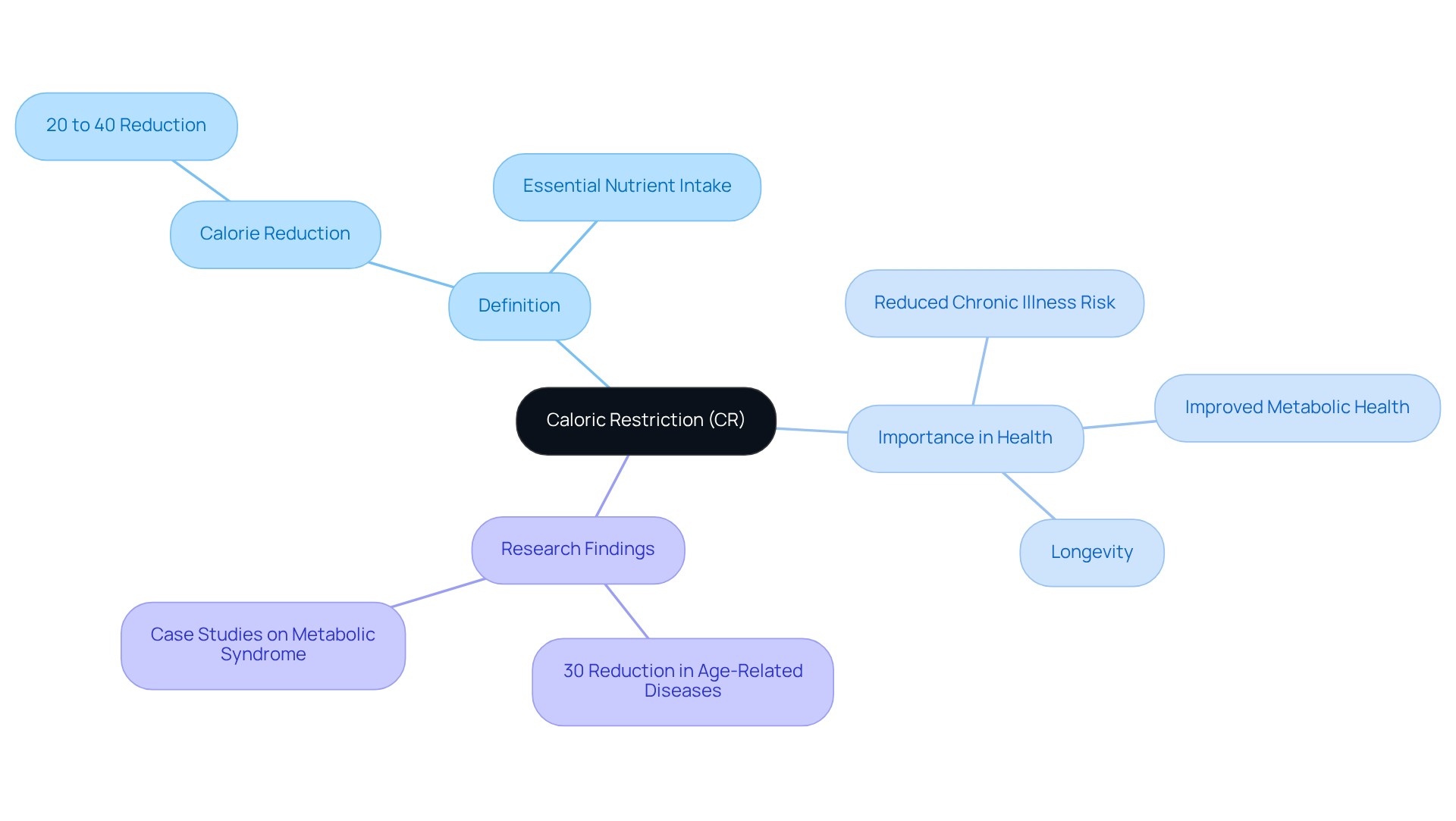Caloric Restriction: Unlock Health Benefits and Longevity
Overview
Caloric restriction (CR) presents significant health benefits and may enhance longevity by reducing calorie intake while ensuring essential nutrients are preserved. This article elaborates on how CR improves metabolic health, lowers the risk of chronic diseases, and activates biological mechanisms that promote cellular repair and reduce inflammation. Ultimately, these factors contribute to a longer, healthier life.
Furthermore, by maintaining a balanced diet during caloric restriction, individuals can experience improved overall well-being. The mechanisms activated through CR not only support physical health but also promote mental clarity and emotional stability. As a result, adopting CR can lead to a holistic enhancement of life quality.
In addition, exploring further resources on CR can provide valuable insights and practical tips for implementation. By understanding the science behind caloric restriction, individuals can make informed decisions that positively impact their health journey.
Introduction
Caloric restriction (CR) has emerged as a powerful dietary strategy, capturing the attention of researchers and health enthusiasts alike due to its profound impact on well-being and longevity. By reducing calorie intake while ensuring essential nutrients remain intact, individuals can unlock a host of health benefits. These benefits range from improved metabolic function to enhanced cognitive abilities.
However, how can one effectively implement caloric restriction without compromising overall health? What specific mechanisms underpin its remarkable effects on aging and disease prevention? Exploring these questions can lead to actionable insights for those interested in adopting this dietary approach.
Define Caloric Restriction and Its Importance in Health
Caloric restriction (CR) is a dietary approach that entails reducing calorie intake by 20% to 40% while still ensuring essential nutrient intake is not compromised. This method has garnered significant interest for its potential to greatly enhance well-being and lifespan. Research indicates that CR can improve metabolic health, lower the risk of chronic illnesses, and even extend lifespan across various species, including primates and rodents. For instance, studies reveal that CR can lead to a 30% reduction in the incidence of age-related diseases in animal models, suggesting that similar benefits may apply to humans.
In 2025, accumulating evidence linking caloric restriction to longevity further highlights its significance. A comprehensive review of aging statistics demonstrates that individuals practicing CR often enjoy better weight management, improved cardiovascular health, and enhanced cognitive function. Case studies reinforce these advantages; for example, individuals with metabolic syndrome who adopted CR reported notable improvements in their wellness markers, such as reduced blood pressure and enhanced lipid profiles.
By understanding the principles of caloric restriction, individuals can make informed dietary choices that align with their wellness goals, particularly as they navigate the aging process. Embracing caloric restriction not only enhances physical well-being but also encourages a proactive mindset towards longevity, empowering individuals to take charge of their wellness journey.

Explore the Biological Mechanisms of Caloric Restriction
Caloric restriction significantly influences various biological processes that contribute to its wellness advantages. One primary mechanism is autophagy, a vital process wherein cells eliminate damaged components, thus promoting cellular repair and regeneration. Research indicates that higher levels of CR correlate positively with the expression of autophagy-related genes, which suggests enhanced cellular well-being and improved insulin sensitivity. This increased sensitivity is crucial for regulating blood sugar levels, ultimately reducing the risk of type 2 diabetes.
Furthermore, CR activates essential pathways associated with lifespan, including the sirtuin and mTOR pathways. Together, these mechanisms enhance metabolic function, decrease inflammation, and reduce the incidence of age-related illnesses. For instance, studies have illustrated that long-term CR can lead to a significant reduction in mitochondrial dysfunction and apoptosis signaling, reinforcing its role as a powerful strategy for promoting longevity.
The protective effects of CR against cancer signaling pathways further underscore its potential in extending both healthspan and lifespan. By understanding these mechanisms, individuals can appreciate the profound impact that caloric restriction has on overall health and longevity.

Discuss the Health Benefits and Longevity Effects of Caloric Restriction
The advantages related to caloric restriction are significant and align with creative anti-aging methods observed in various cultures and studies. Research has shown that caloric restriction can lead to:
- Weight loss
- Improved cardiovascular health
- Enhanced cognitive function
It is associated with lower levels of harmful cholesterol and blood pressure, thereby reducing the risk of heart disease. Furthermore, caloric restriction may delay the onset of age-related diseases, including Alzheimer’s and certain cancers. Studies indicate that individuals who engage in caloric restriction may experience a slower pace of biological aging, ultimately contributing to a longer, healthier life.
This aligns with the dietary habits of the Hunza people, renowned for their exceptional lifespan and vibrant lifestyle, often attributed to their nutrient-dense diet. Insights from Dr. Joseph Dituri’s groundbreaking underwater research further emphasize the potential of innovative, interdisciplinary methods for understanding well-being and longevity. These advantages underscore the importance of considering caloric restriction as a key component of a comprehensive health and wellness strategy, integrating insights from diverse dietary practices and cutting-edge research.

Implement Caloric Restriction: Practical Guidelines and Considerations
Applying energy restriction can be approached through various methods. Here are some practical guidelines:
-
Start Gradually: Begin by decreasing your energy intake by 10-20% and monitor how your body responds. Gradual changes are more sustainable and less overwhelming.
-
Focus on Nutrient Density: Prioritize foods that are rich in nutrients but lower in calories, such as vegetables, lean proteins, and healthy fats. This guarantees you obtain vital nutrients while lowering overall energy consumption.
-
Plan Meals: Meal planning can help you control portions and avoid impulsive eating. Consider preparing meals in advance to maintain consistency.
-
Stay Hydrated: Drinking water can help manage hunger and support metabolic processes. Aim for at least 8 cups of water daily.
-
Listen to Your Body: Pay attention to hunger signals and adjust your food intake as necessary. It’s crucial to steer clear of severe limitations that could result in malnutrition.
-
Seek Expert Advice: Prior to making major dietary adjustments, think about reaching out to a medical professional or a nutrition specialist to confirm that reducing calorie intake is suitable for your personal wellness requirements.
By following these guidelines, individuals can effectively incorporate caloric restriction into their lifestyle, promoting better health and longevity.

Conclusion
Caloric restriction (CR) stands out as a promising dietary approach that not only fosters improved health but also potentially enhances longevity. By reducing calorie intake while ensuring essential nutrients remain abundant, individuals can experience a myriad of health benefits, including better metabolic function, lower risks of chronic diseases, and a proactive approach to aging. This method serves as a beacon for those seeking to take control of their wellness journey and extend their healthspan.
Key insights reveal that caloric restriction activates vital biological mechanisms such as autophagy and the sirtuin pathways, which contribute to cellular repair and improved insulin sensitivity. The evidence supporting CR’s role in:
- Reducing age-related diseases
- Enhancing cardiovascular health
- Promoting cognitive function
underscores its significance in a comprehensive health strategy. Furthermore, practical guidelines for implementing CR demonstrate that sustainable changes can lead to long-lasting benefits.
Ultimately, embracing caloric restriction is not merely a dietary choice but a lifestyle shift that reflects a commitment to health and longevity. By integrating these principles into daily routines, individuals can unlock the transformative potential of caloric restriction, paving the way for a healthier, longer life. As research continues to evolve, the importance of CR in achieving optimal well-being remains clear, encouraging a broader dialogue on the role of diet in enhancing quality of life.
Frequently Asked Questions
What is caloric restriction (CR)?
Caloric restriction (CR) is a dietary approach that involves reducing calorie intake by 20% to 40% while ensuring that essential nutrient intake is not compromised.
Why is caloric restriction important for health?
Caloric restriction is important because it has the potential to enhance well-being and lifespan, improve metabolic health, lower the risk of chronic illnesses, and extend lifespan across various species.
What evidence supports the benefits of caloric restriction?
Research indicates that caloric restriction can lead to a 30% reduction in age-related diseases in animal models, and individuals practicing CR often experience better weight management, improved cardiovascular health, and enhanced cognitive function.
How does caloric restriction affect aging?
Caloric restriction may help individuals manage their weight and improve health markers as they age, fostering a proactive mindset towards longevity and wellness.
Can caloric restriction have effects on metabolic syndrome?
Yes, case studies show that individuals with metabolic syndrome who adopted caloric restriction reported significant improvements in wellness markers, such as reduced blood pressure and better lipid profiles.
What should individuals consider when adopting caloric restriction?
Individuals should understand the principles of caloric restriction to make informed dietary choices that align with their wellness goals, especially as they navigate the aging process.






